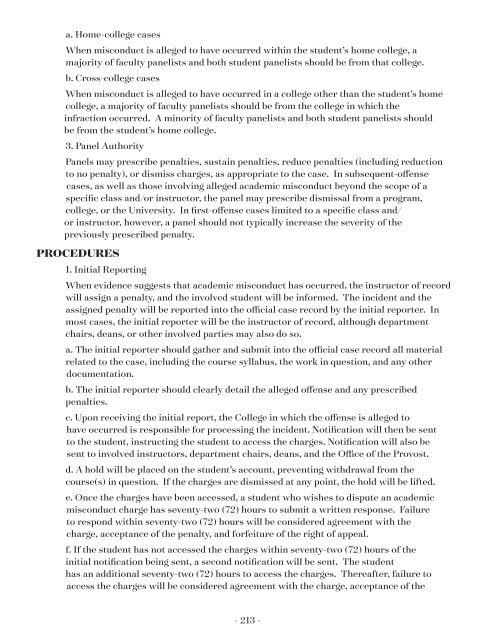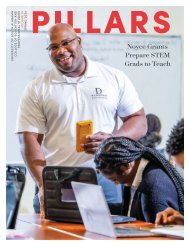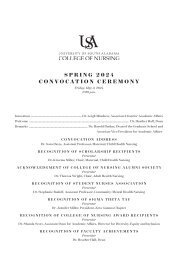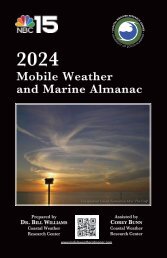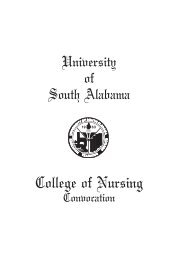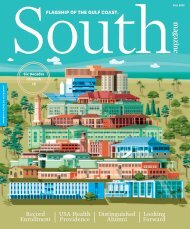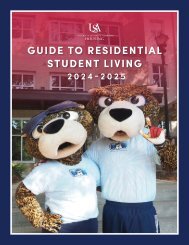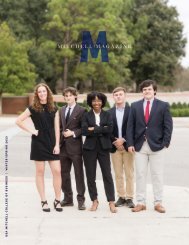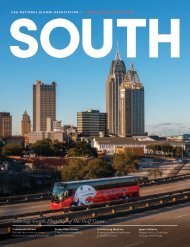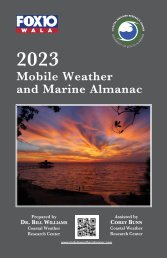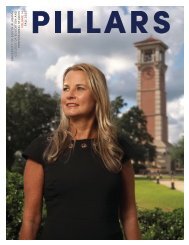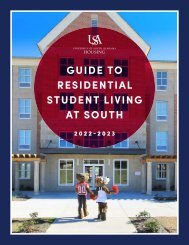The Lowdown 23-24
University of South Alabama Student Handbook
University of South Alabama Student Handbook
Create successful ePaper yourself
Turn your PDF publications into a flip-book with our unique Google optimized e-Paper software.
a. Home-college cases<br />
When misconduct is alleged to have occurred within the student’s home college, a<br />
majority of faculty panelists and both student panelists should be from that college.<br />
b. Cross-college cases<br />
When misconduct is alleged to have occurred in a college other than the student’s home<br />
college, a majority of faculty panelists should be from the college in which the<br />
infraction occurred. A minority of faculty panelists and both student panelists should<br />
be from the student’s home college.<br />
3. Panel Authority<br />
Panels may prescribe penalties, sustain penalties, reduce penalties (including reduction<br />
to no penalty), or dismiss charges, as appropriate to the case. In subsequent-offense<br />
cases, as well as those involving alleged academic misconduct beyond the scope of a<br />
specific class and/or instructor, the panel may prescribe dismissal from a program,<br />
college, or the University. In first-offense cases limited to a specific class and/<br />
or instructor, however, a panel should not typically increase the severity of the<br />
previously prescribed penalty.<br />
PROCEDURES<br />
1. Initial Reporting<br />
When evidence suggests that academic misconduct has occurred, the instructor of record<br />
will assign a penalty, and the involved student will be informed. <strong>The</strong> incident and the<br />
assigned penalty will be reported into the official case record by the initial reporter. In<br />
most cases, the initial reporter will be the instructor of record, although department<br />
chairs, deans, or other involved parties may also do so.<br />
a. <strong>The</strong> initial reporter should gather and submit into the official case record all material<br />
related to the case, including the course syllabus, the work in question, and any other<br />
documentation.<br />
b. <strong>The</strong> initial reporter should clearly detail the alleged offense and any prescribed<br />
penalties.<br />
c. Upon receiving the initial report, the College in which the offense is alleged to<br />
have occurred is responsible for processing the incident. Notification will then be sent<br />
to the student, instructing the student to access the charges. Notification will also be<br />
sent to involved instructors, department chairs, deans, and the Office of the Provost.<br />
d. A hold will be placed on the student’s account, preventing withdrawal from the<br />
course(s) in question. If the charges are dismissed at any point, the hold will be lifted.<br />
e. Once the charges have been accessed, a student who wishes to dispute an academic<br />
misconduct charge has seventy-two (72) hours to submit a written response. Failure<br />
to respond within seventy-two (72) hours will be considered agreement with the<br />
charge, acceptance of the penalty, and forfeiture of the right of appeal.<br />
f. If the student has not accessed the charges within seventy-two (72) hours of the<br />
initial notification being sent, a second notification will be sent. <strong>The</strong> student<br />
has an additional seventy-two (72) hours to access the charges. <strong>The</strong>reafter, failure to<br />
access the charges will be considered agreement with the charge, acceptance of the<br />
- 213 -


